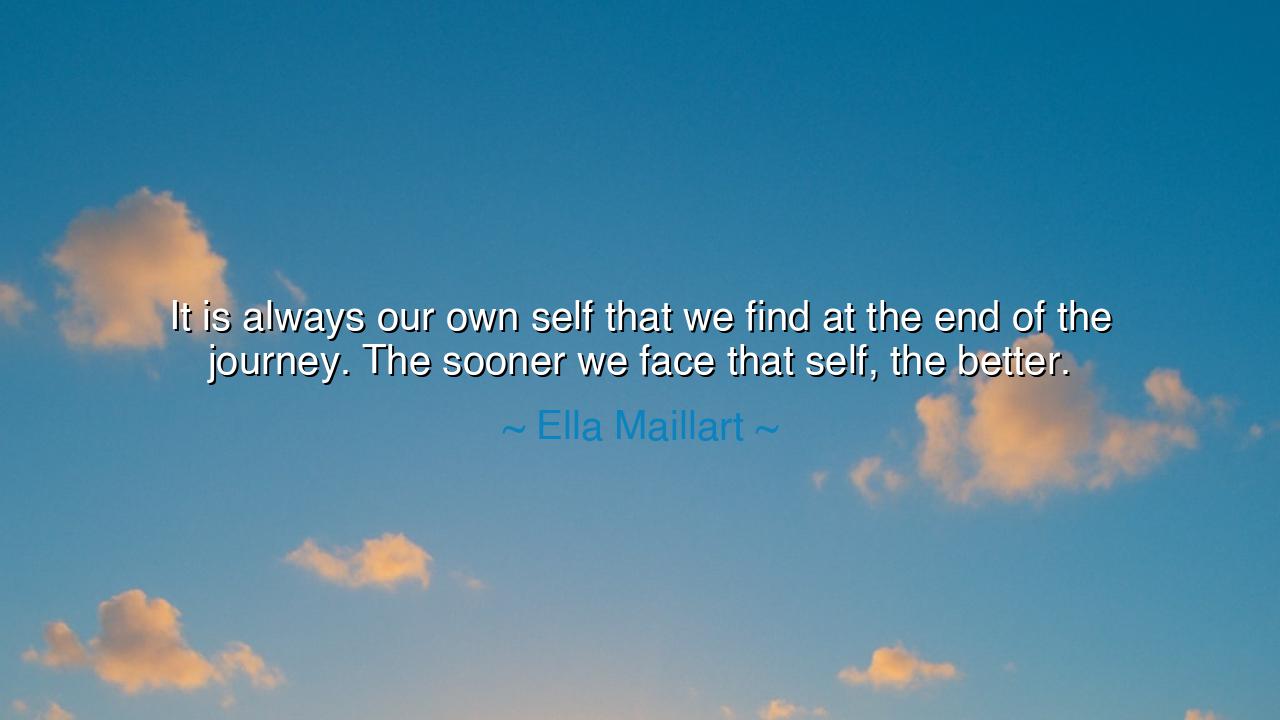
It is always our own self that we find at the end of the
It is always our own self that we find at the end of the journey. The sooner we face that self, the better.






"It is always our own self that we find at the end of the journey. The sooner we face that self, the better." Thus wrote Ella Maillart, the wanderer of mountains and deserts, whose life was a testament to the search for truth. Her words shine like a lamp upon the path: for all our travels, conquests, and pursuits, the final encounter is not with distant lands, but with the hidden chambers of our own soul. The journey outward is but a mirror for the journey inward.
The ancients knew this mystery. The Oracle of Delphi bore the inscription: "Know thyself." For they understood that man may cross seas, ascend mountains, and battle empires, yet if he has not faced his own self, he remains a stranger to the greatest truth. The heroes of myth—Odysseus, Aeneas, Gilgamesh—wandered far, but their final victories were not only over monsters or kingdoms, but over their own fear, pride, and weakness.
Consider the life of Siddhartha Gautama, who became the Buddha. He left his palace, sought wisdom from masters, endured years of wandering and deprivation. Yet at last, under the Bodhi tree, he discovered that the battle was not with the world outside, but with the illusions within. By facing his self, he found peace, and through that, he illuminated the world. His story is the eternal echo of Maillart’s truth.
So too in the modern age, we see explorers who crossed oceans or braved deserts, only to confess that their greatest discovery was of their own soul. Shackleton, leading his men through the frozen wastes, learned endurance and humility not only in ice and storm, but in himself. His journey became a furnace that revealed his true nature—courage, patience, and compassion.
Therefore, let this wisdom be passed down: do not wait until the end of your journey to meet yourself. Turn inward with honesty now, and face the self that hides beneath masks of pride, fear, and desire. For he who knows himself early walks the world with strength; but he who avoids himself will wander endlessly, only to find at the last breath that the greatest road he never traveled was within.






MAMINH ANH
It’s interesting how this quote highlights the importance of facing ourselves. The idea that the sooner we do it, the better, feels like an encouragement to stop running from our own truths. But what if we’re not ready to face those truths? Does rushing to confront ourselves prematurely harm our mental health? At what point do we know we're truly prepared to face ourselves without feeling overwhelmed by the truth? It's such an intriguing idea—what’s your take on this?
GNGiang Nguyen
I’m really struck by the simplicity yet depth of this quote. It makes me think about the idea of personal growth and whether we can truly know ourselves fully. Sometimes, I feel like I'm constantly evolving and not sure who I really am at my core. Does this mean we never fully 'find' ourselves, or is it a continuous process of self-discovery? What do you think? Can the journey ever truly end, or is there always more to discover about ourselves?
BTnguyen tran bao tram
Ella Maillart’s words suggest that we are on a lifelong quest to understand ourselves, and I can’t help but wonder—what does it really mean to 'face' oneself? Does it imply accepting flaws, or is it more about understanding the deeper parts of our character, even the uncomfortable ones? I’ve always been a bit wary of introspection because sometimes it brings up difficult emotions. How can we make this process less overwhelming and more productive?
NBThao Linh Nguyen Bui
I find this perspective both comforting and a bit daunting. The idea of ‘finding ourselves’ at the end of the journey makes me wonder if this means that all the external struggles and achievements are simply a way to understand ourselves better. But what if we never ‘find’ that self? Is the idea of facing ourselves something we actively do, or does it come naturally over time as we age? It's almost like a challenge to be true to who we really are.
TPTu Pham
This quote resonates deeply with me. It feels like a reminder that, no matter how much we try to escape or change ourselves, in the end, we are always confronted with our true nature. Do you think it's possible to change who we are, or is it something we must simply accept? How do you think facing ourselves impacts the course of our lives? It seems like this might be a crucial point in the journey of self-awareness.